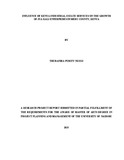| dc.description.abstract | The informal sector is internationally recognized as major engine of social and economic growth in many national and local economies of developing countries. In Kenya, the informal economic sector is often referred to as ‘jua kali’ enterprises (literally meaning business conducted in an open area under fierce heat from sun). The sector has been growing partly through its own momentum and partly due to support obtained from a wide range of public and private financial institutions. Kenya Industrial Estates (KIE) is a government institution, which was established to champion the development of jua kali sector throughout the country. KIE has been providing support to small and medium enterprises, including those in the Jua Kali sector in Meru County for two to three decades. However, its impact on the growth of Jua kali enterprises in the county has not been seriously assessed. The current study sought to investigate the influence of key services provided by Kenya Industrial Estates on the growth of jua kali enterprises in Meru County. The specific objectives of the research were to determine how financial services, business development services and business incubation services by KIE have contributed to increase in number of Jua Kali enterprises, growth in capital base, profitability and increase in staff working in jua kali enterprises. The study adopted a descriptive research design and target population of 150 jua kali enterprises who have acquired KIE services in Meru County. A random sample of 108 jua kali enterprises was selected from the target population using stratified random sampling strategy. Data was collected through questionnaires and direct observation. Quantitative data was entered into excel spread sheets and subsequently imported into SPSS Statistical Program used to calculate frequencies, percentages, and measures of central tendency and standard deviations of means. Analysis for relationships was conducted using regression analysis. The results were tabulated and displayed using frequency tables. The study established that the main source of initial capital for most artisans in Meru was personal savings. Further, the study established that most artisans in Meru have ever applied for a credit facility from Kenya industrial estate. The study also established that most artisans from Meru County have ever attended any of the trainings conducted by KIE. The study concludes that most Jua Kali businesses have benefitted by incubation service provided by KIE. From the study it can be deduced that great opportunities for growth of Micro and Small Enterprises such as Jua Kali Enterprises exist at Kenya Industrial Estates in terms of financing and incubation services. Jua Kali Enterprises are urged to seek incubation and financial services from the Kenya Industrial Estates to enhance their growth since there are very minimal bottlenecks that can hinder them from qualifying for such services. The researcher further recommends that in-depth research should be carried out by interested scholars and/or policy makers on how the Jua Kali Enterprises spurning across Kenya employ the funds given to them by the Kenya Industrial Estates. | en_US |

